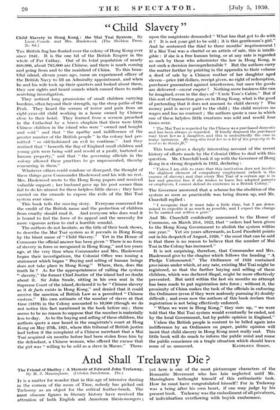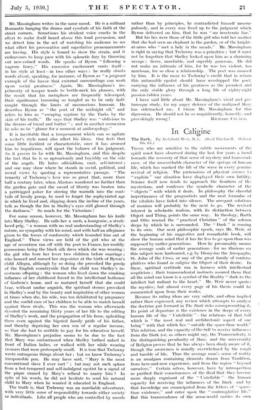And Shall Tr elawny Die ?
The Friend of Shelley : A Memoir of Edward John Trelawny.
IT is a matter for wonder that in this age of intensive dusting in the corners of the room of Time, nobody has picked out Trelawny as an object for the critical feather-brush. The most obscure figures in literary history have received the attention of both English and American thesis-mongers ;
yet here is one of the most picturesque characters of the Romantic Movement who has lain neglected until Mr. Massinghant bethought himself of this enthusiastic task. How he must have congratulated himself ! For in Trelawny was a being after his own heart, if one may judge by his present book. Trelawny was the embodiment of all privateers, of individualism overflowing with boyish exuberance.
Mr. Massingham writes in the same mood. He is a militant Romantic banging the drums and cymbals of his faith at the street corners. Sometimes his strident voice cracks in the effort to make itself heard above this loud percussion, and we detect him in the act of watching his audience to see what effect his provocative and superlative pronouncements are having. His style is bound to show the strain, and it endeavours to keep pace with his splenetic fury by throwing out new-coined words. He speaks of Byron " following a vagrona fancy." His excessive excitement vents itself— _in his style at least—in two other ways : he really chucks words about, speaking, for instance, of Byron as a pregnant example of the havoc that external surroundings can work upon social greatness." Again, Mr. Massingham's im- petuosity of temper tends to bottle-neck his phrases, with the result that his metaphors are frequently telescoped, their significance becoming so tangled as to be only half- caught through the knots of unconscious humour. He describes Byron ac " the poet of the midnight oil," and refers to him as " escaping capture by the Turks by the skin of his teeth." He says that Shelley was " oblivious to the decrees of bread and butter ; and in another connexion he asks us to " glance for a moment at anthropology."
It is inevitable that a temperament which can so agitate a writer's style must also affect his ideas. One feels that some little incident or characteristic, once it has aroused him to impatience, will upset the balance of his judgment. So it proves to be with Mr. Massingham, and this despite the fact that he is so uproariously and boyishly on the side of the angels. He hates officialdom, cant, self-interest ; and one may show where he stands in social, political, and moral views by quoting a representative passage. " The tenacity of Trelawny's love was so great that, more than half a century later, when Alastors wandered no further than the garden gate and the sword of liberty was beaten into a perbvigged poker for stirring the warmth into the coat- tails of family pomp, he used to forget the asphyxiated age in which he lived and, slipping down the incline of the years, talk as though the fire in Shelley's eyes still glowed through the darkness." So much for the Victorians !
For some reason, however, Mr. Massingham has his knife into Mary Shelley. He calls her a snob, a bourgeoise, a strait- laced prig, " a woman with no real understanding of Shelley's nature, no sympathy with his mind, and with half an allegiance given to the forces of conformity which hounded him out of England." These views are held of the girl who at the age of seventeen ran off with the poet to France, her worldly possessions being the black silk dress which she was wearing : the girl who bore her lover two children before marriage ; who housed and nursed her step-sister at the birth of Byron's child Allegra, although by so doing she provoked the gossip of the English countryside that the child was Shelley's in- cestuous offspring : the woman who lived down the crushing influence of her childhood forced in the intellectual hothouse of Godwin's home, and so matured herself that she could bear, without undue anguish!, the spiritual storms provoked in Shelley's soul by the beauty and inspiration of other women at times when she, his wife, was too debilitated by pregnancy and the sordid care of her children to be able to match herself against these rivals. This was the woman who afterwards devoted the remaining thirty years of her life- to the editing of Shelley's work, and the. propagation of his fame, upholding them even against the bigoted family pride of his father, and thereby depriving her own son of a regular income, so that she had to scribble to pay for his education herself. Mr. Massingham's prejudice seems to be due to the fact that Mary was embarrassed when Shelley bathed naked in front of Italian ladies, or walked with her while wearing trousers that were grotesquely small. It is true that Trelawny wrote outrageous things about her ; but we know Trelawny's irresponsible pen. He may have said, " Mary is the most conventional slave I ever met " ; but may not such spleen from a hot-tempered and self-indulgent egotist be a signal of the pique caused by Mary's refusal to marry him ? In spite of his words, he did not hesitate to send his natural child to Mary when he wanted it educated in England.
The truth is, that Trelawny was an unreliable adventurer, with very little sense of responsibility towards either society or individuals. Like all people who are controlled by moods rather than by principles, he contradicted himself unscru- pulously, and in every way lived up to the judgment which Byron delivered on him, that lie was " an inveterate liar."
But his lies were those of the little girl who told her mother that she had seen an elephant in the garden, or of the knight- at-arms who " met a lady in the meads." Mr. Massingham is right in saying that Trelawny was a primitive ; but it must not be forgotten that Shelley looked upon bins as a charming Savage ; fierce, unreliable, and superbly generous. He did not make an intimate of him, for he was too violent, too narcissan, for so close a relationship. The poet was amused by him. It is the more to Trelawny's credit that in return this untamable egotist should have worshipped the [met, carrying the influence of his greatness as the proudest and the only stable glory through a long life of eighty-eight passion-ridden years.
I have said little about Mr. Massinglumis vivid and pic- turesque study, for my angry defence of the maligned Slaty has sidetracked me. I blame Mr. Massingham for this digression. Ile should not be so magnificently, honestly, and











































 Previous page
Previous page